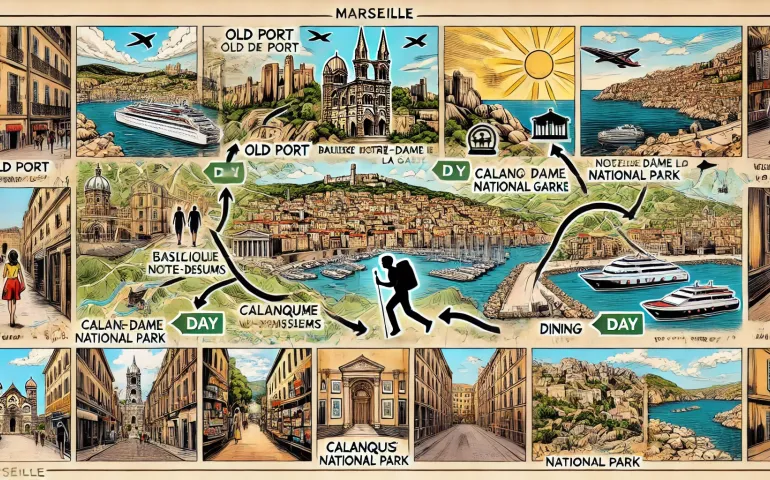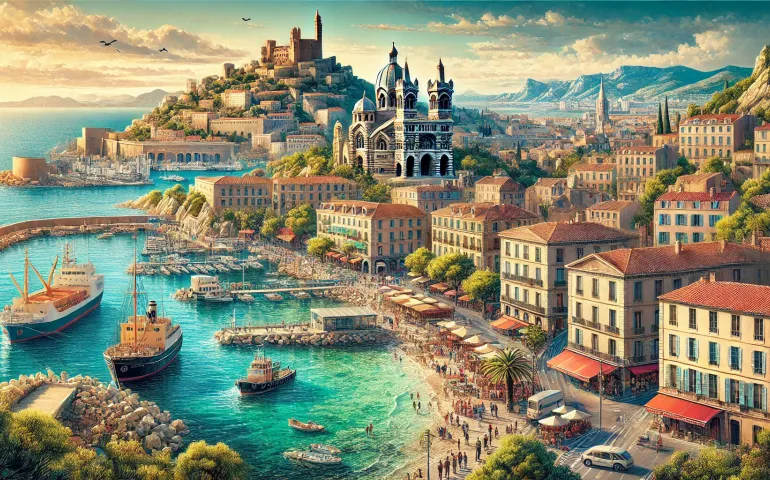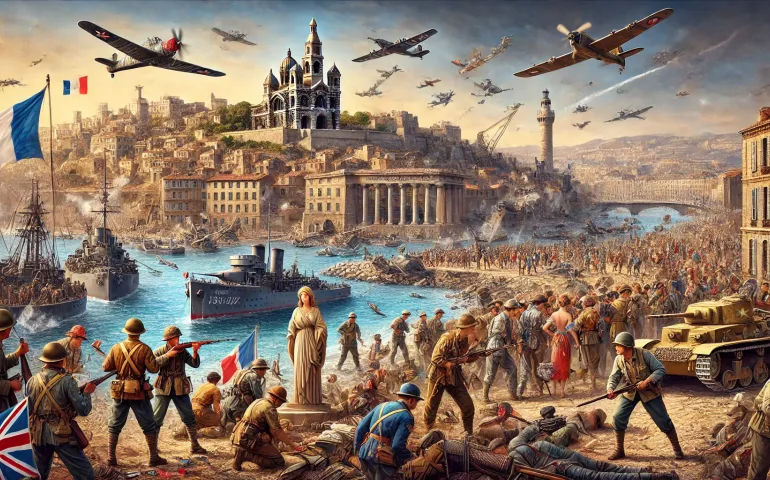About Place
- "A vibrant melting pot of culture and history."
- "A stunning Mediterranean port city with breathtaking coastal views."
- "A culinary paradise with a rich blend of flavors."
Reasons to Visit
- Historical Significance and Architecture : Marseille is one of the oldest cities in France, with a history dating back over 2,600 years. The city's architecture reflects its rich past, featuring the stunning Basilique Notre-Dame de la Garde, the historic Old Port, and the ancient Fort Saint-Jean. The blend of medieval and modern architecture makes Marseille a visually captivating destination.
- Cultural Diversity : Marseille is a cultural melting pot, influenced by various Mediterranean civilizations. This diversity is evident in its vibrant neighborhoods, bustling markets, and annual festivals. The city's cultural scene includes numerous museums, theaters, and art galleries, such as the MuCEM (Museum of European and Mediterranean Civilisations), which showcase its dynamic heritage.
- Natural Beauty and Outdoor Activities : Nestled between the sea and the mountains, Marseille offers an array of outdoor activities. The Calanques National Park, with its stunning limestone cliffs and crystal-clear waters, is perfect for hiking, rock climbing, and swimming. The city's coastline is dotted with beautiful beaches, and the nearby Frioul Islands provide opportunities for sailing and snorkeling.
Visa
- EU/EEA/Swiss Citizens : No visa required for stays of any duration.
- USA, Canada, Australia, New Zealand, Japan, South Korea : No visa required for stays up to 90 days within a 180-day period.
- Other countries : Schengen Visa required. Check with the French consulate or embassy in your country for specific requirements.
Travel Expenses
- Travel to & from destination :
- Round-trip flight from Paris to Marseille for two : $200 per person, totaling $400.
- Hotel cost :
- Average cost of a mid-range hotel in Marseille : $150 per night.
- Total for 4 nights for two people : $600.
- Food cost :
- Average cost of lunch : $25 per person.
- Average cost of dinner : $40 per person.
- Total food cost for 5 days for two people : $650.
- Activity cost :
- MuCEM entry : $12 per person.
- Boat tour in Calanques : $30 per person.
- Atelier Cézanne entry : $10 per person.
- Total activity cost for two people : $104.
- Near destination travel cost :
- Car rental for 5 days : $50 per day, totaling $250.
Total Estimated Cost : $2004.

Best Itinerary
Day 1 : Arrival and Old Port Exploration Arrive in Marseille and check into your hotel. Start your exploration at the Old Port, the heart of the city. Walk around the harbor, watching the boats and enjoying the lively atmosphere. Have lunch at Le Miramar, known for its traditional Bouillabaisse. In the afternoon, visit the nearby Fort Saint-Jean and the MuCEM, which offers fascinating exhibits on Mediterranean cultures. For dinner, head to Chez Fonfon, a cozy restaurant in the Vallon des Auffes, and try their seafood dishes. In the evening, take a stroll along the Promenade du Soleil and enjoy the stunning views of the Mediterranean.
Day 2 : Basilique Notre-Dame de la Garde and Le Panier Start your day with a visit to the Basilique Notre-Dame de la Garde, the iconic basilica overlooking the city. Spend the morning exploring the basilica and taking in the panoramic views. For lunch, visit La Table du Fort for a delicious Provençal meal. In the afternoon, wander through Le Panier, the oldest neighborhood in Marseille, with its narrow streets, colorful buildings, and artisan shops. In the evening, enjoy a seafood dinner at L'Epuisette, located by the sea. End your day with a relaxing drink at a local café in Le Panier.
Day 3 : Calanques National Park and Beaches Dedicate your third day to exploring the natural beauty of the Calanques National Park. Start early with a hike through the stunning limestone cliffs and enjoy breathtaking views of the turquoise waters. Pack a picnic lunch and take a break at one of the secluded beaches within the park. In the afternoon, continue your hike or take a boat tour to see the Calanques from the sea. For dinner, head to Le Petit Nice Passedat, a Michelin-starred restaurant offering exquisite Mediterranean cuisine. End your day with a nightcap at a beachside bar.
Day 4 : Day Trip to Aix-en-Provence Take a day trip to the nearby town of Aix-en-Provence. Start with a visit to the Cours Mirabeau, a beautiful tree-lined avenue, and enjoy a coffee at one of the charming cafés. Explore the town's historic sites, including the Saint-Sauveur Cathedral and the Musée Granet. Have lunch at Le Formal, a renowned restaurant in Aix. Spend the afternoon visiting the Atelier Cézanne, the studio of the famous painter Paul Cézanne. Return to Marseille in the evening and have dinner at La Boîte à Sardine, a popular seafood restaurant. Finish your day with a relaxing walk along the Corniche Kennedy.
Day 5 : Shopping and Departure On your last day, explore the markets and shops of Marseille. Visit the Marché des Capucins, a bustling market offering fresh produce, spices, and local specialties. Have lunch at Les Halles de la Major, a gourmet food market with a variety of stalls. In the afternoon, shop for souvenirs in the Rue Saint-Ferréol, Marseille's main shopping street. For dinner, enjoy a meal at Chez Madie Les Galinettes, a traditional Provençal restaurant. After dinner, head to the airport for your departure.

Safety Tips
- Always keep your belongings secure and be mindful of pickpockets.
- Stay aware of your surroundings, especially in crowded places.
- Use official and reputable transportation services.
- Avoid walking alone at night in unfamiliar areas.
- Keep a copy of your passport and important documents.
- Learn basic French phrases to communicate in emergencies.
- Follow local customs and respect cultural differences.
- Stay hydrated and protect yourself from the sun.
- Familiarize yourself with emergency exits in your accommodation.
- Keep emergency contact numbers handy.
Flights
- Air France : Direct flight from Paris to Marseille, approximately 1.5 hours, costing around $100 each way.
- EasyJet : Direct flight from Paris to Marseille, approximately 1.5 hours, costing around $80 each way.
- Ryanair : Direct flight from Paris to Marseille, approximately 1.5 hours, costing around $60 each way.
Hotels
- InterContinental Marseille - Hotel Dieu
- Sofitel Marseille Vieux-Port
- NH Collection Marseille
- Radisson Blu Hotel, Marseille Vieux Port
- Grand Hotel Beauvau Marseille Vieux-Port
Contacts
- Nearest Indian Embassy : Embassy of India, Paris
- Phone : +33 1 40 50 70 70
- Email : cons.paris@mea.gov.in
- Police : 17
- Ambulance : 15
- Firefighters : 18
Country
Closet Airport
- Marseille Provence Airport (MRS)
Nearest City
- Paris
Heritage Sites
- The Old Port and Fort Saint-Jean
Airlines
- Air France
- Ryanair
- EasyJet
- Lufthansa
- British Airways
Currency
- Euro (EUR)
Languages Spoken
- French
Real Story
The Liberation of Marseille in World War II
In the summer of 1944, Marseille found itself at the heart of one of the most significant military operations of World War II. The liberation of Marseille was a pivotal moment in the Allied campaign to free France from Nazi occupation and was part of Operation Dragoon, the Allied invasion of Southern France.
The operation began on August 15, 1944, when Allied forces landed on the beaches of the French Riviera. The primary objective was to secure the ports of Toulon and Marseille, which were crucial for supplying the advancing Allied armies. The liberation of Marseille was assigned to the French II Corps, commanded by General Jean de Lattre de Tassigny, and the U.S. 3rd Infantry Division.
The battle for Marseille was intense and swift. The French Resistance in the city had been preparing for this moment, gathering intelligence and sabotaging German efforts. As the French and American forces approached, the Resistance launched a coordinated uprising, disrupting German defenses and communications. The city's strategic points, such as bridges, roads, and the Old Port, became battlegrounds as the Allies and Resistance fighters fought to wrest control from the occupying forces.
By August 21, the French and American forces had encircled Marseille. The German garrison, under the command of General Hans Schaeffer, was well-entrenched, but the relentless assault by the Allies, coupled with the fervent actions of the Resistance, weakened their resolve. On August 23, after several days of fierce street fighting and heavy bombardment, the German forces in Marseille surrendered.
The liberation of Marseille was a significant victory for the Allies. It not only secured a vital supply port but also boosted the morale of the French population and the Allied forces. The swift and decisive liberation demonstrated the effectiveness of the combined Allied and Resistance efforts and marked a turning point in the Southern France campaign.
In the aftermath, Marseille faced the daunting task of rebuilding. The city had suffered considerable damage during the fighting, but the resilience and determination of its citizens shone through. The liberation brought a renewed sense of hope and freedom, as the people of Marseille worked together to restore their city and their lives.
The story of Marseille's liberation is a testament to the courage and unity of the Allied forces and the French Resistance. It is a reminder of the sacrifices made and the triumph of the human spirit in the face of adversity. Today, the events of August 1944 are commemorated in Marseille, honoring the bravery of those who fought for the city's freedom and the enduring legacy of their victory.
Cuisine
Marseille's cuisine is a delightful reflection of its rich cultural heritage and coastal location. The city's most iconic dish is Bouillabaisse, a traditional Provençal fish stew made with a variety of Mediterranean fish, shellfish, and aromatic herbs, served with a side of rouille (a garlic saffron mayonnaise) and crusty bread. This hearty and flavorful dish embodies the essence of Marseille's culinary traditions.
Another local specialty is Pieds et Paquets, a savory stew made with sheep's feet and stuffed tripe, slow-cooked in a rich tomato and white wine sauce. This rustic dish highlights the city's knack for turning humble ingredients into mouthwatering delicacies. Additionally, Marseille's bustling markets and seafood restaurants offer an array of fresh seafood, including oysters, mussels, and sea urchins, often enjoyed raw or lightly cooked to preserve their natural flavors.

Culture and History
Marseille, as France's second-largest city and one of its oldest, offers a unique cultural experience shaped by centuries of diverse influences. Founded by Greek sailors around 600 BC, Marseille has evolved into a vibrant port city, embracing a blend of cultures, languages, and traditions. The city's history is a tapestry woven with threads from the Greeks, Romans, and various Mediterranean civilizations, each leaving an indelible mark on its architecture, cuisine, and lifestyle.
Marseille's cultural diversity is one of its defining characteristics. The city's neighborhoods, such as Le Panier, Noailles, and La Plaine, reflect its multicultural population, with a mix of French, Italian, Armenian, North African, and Comorian communities. This diversity is celebrated through numerous cultural festivals, including the Fête de la Musique, the Fiesta des Suds, and the Festival de Marseille, which showcase music, dance, and art from around the world.
The city's rich cultural heritage is preserved in its many museums and historical sites. The MuCEM (Museum of European and Mediterranean Civilisations) offers an extensive collection of artifacts and exhibits that trace the history and cultures of the Mediterranean region. The Basilique Notre-Dame de la Garde, perched on a hill overlooking the city, is a symbol of Marseille's spiritual and architectural heritage. The Old Port, with its bustling fish market and historic Fort Saint-Jean, serves as a reminder of the city's maritime roots.
Marseille's culinary scene is a reflection of its cultural mosaic. The city is famous for its Bouillabaisse, a traditional fish stew, and its vibrant markets, such as the Marché des Capucins and the Marché de Noailles, offer a sensory experience with their array of spices, fresh produce, and international flavors. Dining in Marseille is not just about the food; it's about experiencing the convivial atmosphere and the blend of influences that make each meal unique.
The city's artistic spirit is evident in its street art, theaters, and music venues. Marseille has a thriving contemporary art scene, with numerous galleries and street art projects, such as the Cours Julien and the Friche la Belle de Mai, showcasing local and international artists. The city's theaters, including the Théâtre National de la Criée and the Opéra de Marseille, host a variety of performances, from classical music to modern plays.
Marseille's identity is also shaped by its location, nestled between the sea and the hills. The Calanques National Park, with its rugged cliffs and turquoise waters, offers a natural escape for hiking, swimming, and boating. The Frioul Islands, just a short boat ride from the Old Port, provide a tranquil retreat with their unspoiled landscapes and historic fortifications.
In summary, Marseille's culture is a dynamic blend of history, diversity, and natural beauty. Its vibrant neighborhoods, rich culinary traditions, and thriving arts scene make it a unique destination that continues to inspire and captivate visitors from around the world.
